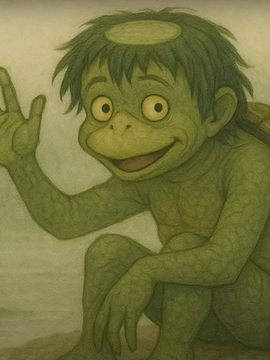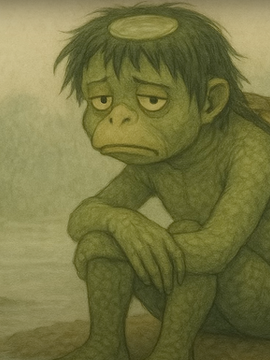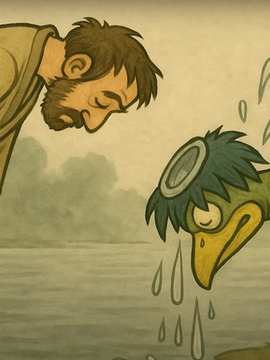
Mythology & Folklore
Published July 12, 2025
By Fairlane Raymundo
The Kappa — Introvert of the Underworld
The River Monster With Stage Fright
They say a simple bow can go a long way in Japan — a sign of respect, gratitude, or apology.
But according to centuries-old legends, the right bow might also save your life.
There’s a creature lurking in rivers and streams, one that’s been feared, respected, and occasionally fed cucumbers. It’s not the sharpest fang in the folklore, but it has its quirks… and one very particular weakness that turns a polite gesture into a survival tactic.
This is the story of the Kappa — the only monster you can defeat with good manners.
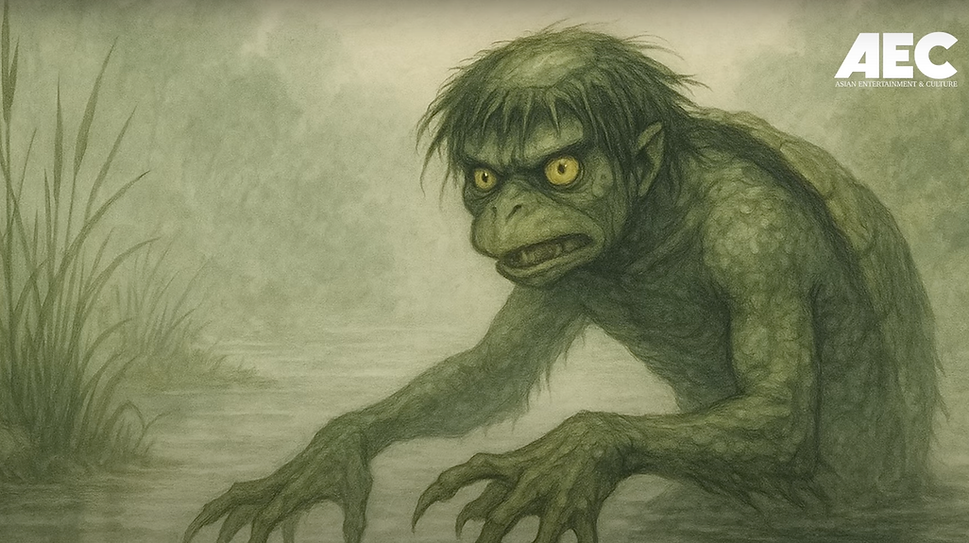
Who (or What) Is the Kappa?
The Kappa is one of Japan’s most peculiar mythological creatures. He’s a yokai — a type of supernatural being — with the general appearance of a child-sized humanoid. But that’s where the normal ends.
Imagine a creature with a turtle shell, webbed hands and feet, a beak for a mouth, and skin that smells faintly of pond water. Some depictions even give him a frog-like gait or scaly skin. He lives in rivers and lakes, prefers humid environments, and, strangely, has a small dish or bowl embedded in his skull that’s filled with water.
That dish? It’s everything. The water inside it is the source of his strength, energy, and supernatural powers. If it spills — and yes, it spills easily — the Kappa loses all its power, collapses, and becomes completely helpless.
It’s like a portable battery pack for a very anxious water goblin.
The Legend of the Polite Defeat
Here’s where things get... wonderfully ridiculous.
The Kappa may be a mythical menace, but he’s also unfailingly polite. If you encounter one in the wild, and you bow respectfully, the Kappa is socially obligated to bow back. When he does, the water from his head spills out — and just like that, he’s out cold.
That’s it. No battle. No dramatic escape. Just a courteous dip of the head and boom — instant KO.
Folktales say that villagers who lived near Kappa-inhabited rivers would teach children to bow if they ever spotted one. It wasn’t just respectful — it was practical. And kind of hilarious.
Powers, Weaknesses, and Butt Stuff
Now, for the stranger parts.
In theory, the Kappa is dangerous. He has the strength to pull grown adults underwater.
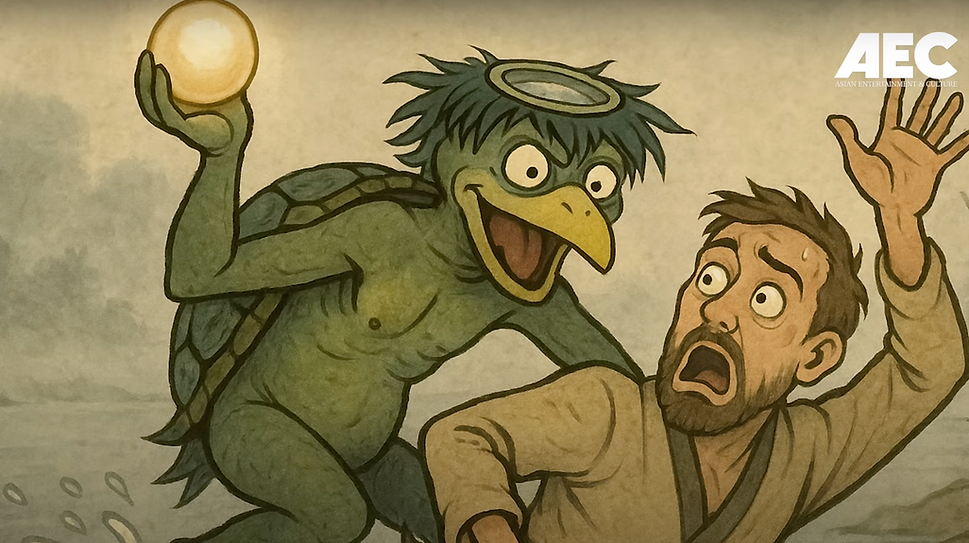
He’s said to love sumo wrestling. And most notoriously, he’s obsessed with extracting something called a shirikodama — a mythical ball said to reside inside a person’s… well, butt.

No one really knows what the shirikodama is supposed to be — maybe a soul, maybe a source of vitality — but legends insist that the Kappa will try to remove it. The concept is both horrifying and absurd, and yet it’s one of the defining traits of the creature in Japanese folklore.
But don’t panic. The Kappa, despite his reputation, is usually too socially anxious to actually go through with anything. If you catch him mid-approach, he might stammer, blush, and ask you politely if he can "borrow your, um... bottom pearl." And if you refuse? He’ll likely mumble an apology and go eat a cucumber instead.
Cucumber: The Peace Offering
Speaking of cucumbers — the Kappa loves them. Like, really loves them. So much so that families who lived near rivers would sometimes write their names on cucumbers and toss them into the water as offerings.
The idea? “Please don’t drown us. Here’s your favorite snack.”

Some stories suggest that if a Kappa receives a cucumber with your name on it, it will remember you and spare your life. Others say the offering is enough to prevent attacks altogether.
Either way, if you ever visit rural Japan and plan to hike near freshwater, maybe pack a cucumber or two. Just in case.
Between a Myth and a Meme
Despite his weirdness — or maybe because of it — the Kappa has remained popular in Japan for generations. He appears in ancient scrolls, shrine carvings, woodblock prints, and more recently, in manga, anime, children’s books, and video games.
He’s evolved from a fearsome water demon to a comedic, often sympathetic character — a lonely creature with poor social skills and a passion for sumo and veggies. Some portray him as mischievous but harmless, others as a symbol of environmental guardianship, warning people to respect rivers and the spirits within.
There are even shrines dedicated to Kappas, like the one in Tokyo’s Kappabashi district. Visitors leave cucumbers, pray for protection, or just snap a selfie with the nearest turtle statue.
He may not have the haunting elegance of a kitsune or the terrifying flair of a tengu, but the Kappa holds a special place in Japan’s folklore — one that blends fear, humor, and humanity in equal parts.
How to Survive a Kappa Encounter (For Real)
Let’s say you’re walking by a river and you spot something watching you — small, greenish, possibly holding a cucumber. What should you do?
-
Don’t panic. He’s probably debating whether or not to approach you.
-
Bow. He’ll bow back, spill his head water, and pass out.
-
Offer a cucumber. It works like magic — or at least like social bribery.
-
Back away slowly. He won’t chase. He’s already spiraling about how awkward that interaction was.
Congratulations — you’ve just survived an encounter with one of Japan’s oldest river spirits using nothing but good manners and snack diplomacy.
A Legend You Can’t Help But Root For
The Kappa is many things: a cautionary tale, a mischievous spirit, a lonely river dweller with oddly specific interests. He’s the kind of creature who wants to wrestle you... but also wants you to like him. Who might steal your soul-pearl… but also might trip over his own politeness trying to ask for it.
In a world full of monsters that attack without warning, the Kappa stands out as the one who hesitates, bows, and maybe eats a cucumber before trying again tomorrow.
He may be a menace of the river — but only if you forget to say hello first.
Related Video
REWIND
Capiz — a coastal province famous for its seafood and scenic sunsets — carries a deeper reputation among locals. To outsiders, it may seem like a sleepy town. But to many Filipinos, it's known as the land of witches, aswangs, and mangkukulams. The kind of place where superstition lives not just in the stories of lolas, but in the way people move after dark.
In a world where security cameras are as common as streetlights, and passwords are longer than your grocery list, there's a village in India that lives by a very different rulebook. Welcome to Shani Shingnapur, a tiny village in the Ahmednagar district of Maharashtra, where locks are unnecessary and trust is the strongest form of protection.
More From AEC
You May Also Like
01
02
03


